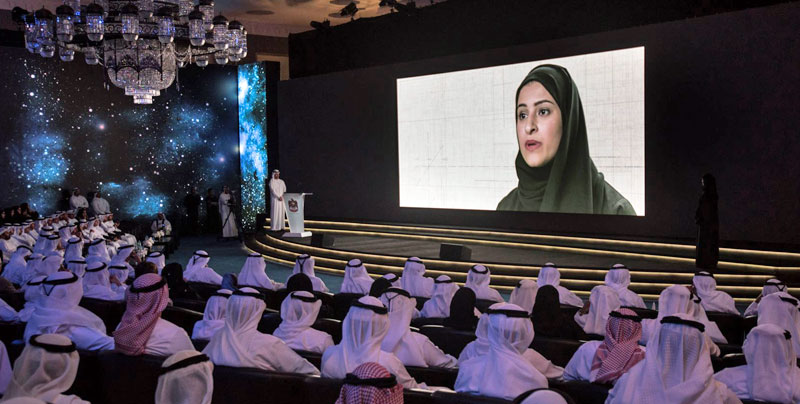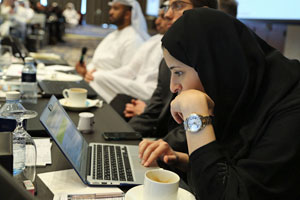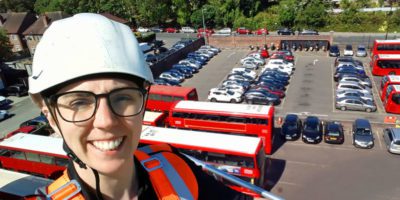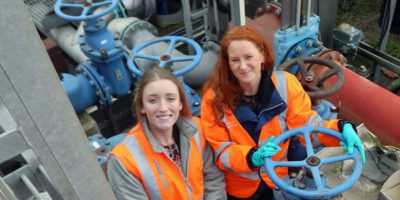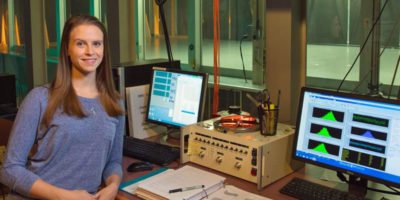Sarah Al-Amiri is the United Arab Emirates’ Minister of State for Advanced Technology, chair of the UAE Space Agency and the UAE Council of Scientists, and deputy project manager of the Emirates Mars Mission. Sarah was born in the UAE and studied computer engineering at the American University of Sharjah, earning bachelor’s and master’s degrees. She was always interested in aerospace engineering but grew up at a time when UAE did not have a space programme.
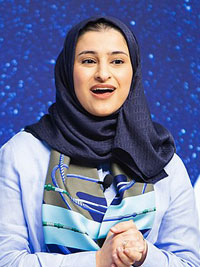
“When it comes to diversity of thought, my experiences have taught me that true innovation and insight is about combining different genders, ages, nationalities, fields of expertise, and backgrounds.”
Counting stars, solar systems and planets
For as long as I can remember I have been fascinated with space, constantly thinking about the number of stars, solar systems and planets in the sky that we simply don’t know about. However, when I entered higher education careers or studies in space exploration weren’t a realistic option in the United Arab Emirates, so I followed another passion of mine and embarked on a degree in computer science at the American University of Sharjah.
In the summer of 2008, during my internship at a large service provider, I got my first insight into what my life would look like after graduating at the end of that year. As I moved from department to department, I realised that my degree in computer engineering would only ever be used to maintain existing systems, deployed by global corporations and operated by the company I interned at. It was a depressing realisation, to be honest.
Heaven-sent opportunity
When I graduated in 2008, I literally stumbled upon the Mohammed bin Rashid Space Centre, known back then as the Emirates Institution for Advanced Technologies. It seemed like, literally, a heaven-sent opportunity and so I joined MBRSC as a software engineer.
I found myself working on earth observation satellites and expanding my capabilities beyond reason – it was literally a limitless opportunity and I found myself challenging everything I had seen as important or desirable in terms of career options – I had gone from the prospect of working on network maintenance to helping to build and operate spacecraft!
I progressed at MBRSC to head research and development, working on high altitude pseudo-satellites as well as imaging satellites and then we were given the opportunity to develop the Emirates Mars Mission [EMM] and I found myself making the quantum leap from systems and software engineering into Mars science and working as the science lead on EMM.
One of the key roles of the EMM project was to expand our national capabilities in scientific research in space and other sectors, so I went on to Chair the Emirates Scientist’s Council before, in 2017, I was named as Minister for Advanced Sciences.
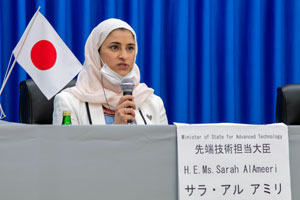
I was made chair of the UAE Space Agency, which again forges that linkage between our work on space systems development to driving advancement in our private sector in the areas of advanced technology, data science and other leading-edge innovation-based opportunities.
Chairing the UAE’s Space Agency
There are two primary parts to my role as Chair of the UAE Space Agency. Firstly, I am responsible for overseeing the progression of the UAE’s space programme; helping the country to embark on space exploration missions that enable us to expand the breadth of our knowledge, and better understand the neighbouring planets and the solar system. Much of this is dependent on forging successful partnerships with the international space community, ensuring the UAE is at the forefront of space exploration.
The second part of the role is to help develop the UAE’s space industry as part of the country’s transition to a knowledge-based economy, enhancing our reputation as a global destination for developing technology-reliant future industries. It is vital that the next generation looks for careers in the industries of the future, so developing the capabilities and opportunities of our youth is and we already seeing this pay dividends; the EMM team’s average age is 27.
We’re also building strategies for the development of the space sector and spin-off industries as a private-sector effort – helping new start-ups, inviting internationally-based innovators to base themselves here in the Emirates and combine their ideas with our business environment and the many, many advantages this offers them. And we’re interested in investigating international collaborations, which is something that lies at the very heart of our space programme.
Emirates Mars Mission
The Emirates Mars Mission (EMM) is the UAE’s first mission to Mars and was conceived back in 2014 with a view to reaching Mars by the country’s 50th anniversary. It was important that EMM was not just a technology demonstrator, but created novel science that was of value to our human understanding of Mars. And EMM was designed to be disruptive, to become an accelerator of our capabilities in space systems engineering, science and data analysis.
We entered Mars orbit on 9th February this year and commenced our science data gathering in earnest early in May. The first data from the mission will be released for free use globally in October and from then for the next Martian year, which is equivalent to roughly one earth year.
Our aim is to build the first planetary picture of Mars’ atmosphere, something we’re doing using three key instruments; the Emirates eXploration Imager, the Emirates Mars InfraRed Spectrometer and the The Emirates Mars Ultraviolet Spectrometer, all of which help the probe to study the dynamics in the Martian atmosphere, on both diurnal and seasonal timescales. This has never been done by any previous Mars mission.
A recurring theme within the mission is that EMM is not about sending a probe to Mars; but represents a greater hope for the region, that in empowering the youth in the fields of science and technology and having overarching goals; nations today, just like our ancestors, can aspire to reach for the stars, contribute on a global scale and creating impactful policies that will influence generations to come.
We are incredibly proud of everything we have achieved so far with the Emirates Mars Mission. I truly believe it has shown how in the face of remarkable challenges collaboration across nations, geographies and creeds can forge brilliant outcomes that benefit the entire scientific community. But I should add that we are not finished and there is still so much more to be done, both with regards to the Emirates Mars Mission itself as well as future missions. This really is only the beginning of the UAE’s space journey.
Life on Mars?
I think that this is an incredibly important statement of intent for our young people, that our commitment to space, science and research is not fleeting or passing, but an enduring direction of travel that will see us investing to create a vibrant, dynamic space system, research and development sector here in the Emirates.
We see space as a vital economic opportunity, something we are keen to develop as a private sector-led movement. Many of the questions we have to ask ourselves about establishing a viable settlement on Mars are questions we are asking ourselves as a desert nation today: how do we build resilient food production? How do we handle resource management and water scarcity? How do we manage climate change and sustainability? So, Mars 2117 is a direction of travel, but our focus is really on building capabilities and opportunities now and into the near future.
Diversity makes us smarter and quicker
When it comes to diversity of thought, my experiences have taught me that true innovation and insight is about combining different genders, ages, nationalities, fields of expertise, and backgrounds.
Without a diverse range of perspectives, we risk stasis and as the world evolves at an unbelievable pace, we cannot expect to meet challenges with the status quo. And while no one approach to science is ever the ‘right’ approach, working together in diverse teams makes us smarter and quicker, with opportunity to benefit from the unique ideas and perspectives that each member brings.
It was the unique blend of diversity and collaboration that allowed us to achieve this mission in the timeline we did and placing value on this and embracing new ways of thinking could ultimately achieve greater success across all scientific fields.
Collaboration and teamwork
I very much enjoyed speaking at the recent Royal Aeronautical Society’s President’s Conference. It provided a great opportunity to not only talk about the Emirates Mars Mission, but to explore ways in which the UK and UAE space sectors can come together to enhance space exploration globally.
The cooperative approach of this mission isn’t just a roadmap for how we can quickly develop and launch a spacecraft. It sets out an approach to guide all nations that are developing interplanetary space exploration programmes. Collaboration and teamwork will be key to developing and adopting innovative new technologies that will spur the next wave of human space exploration. And that will mean opportunities for international teams as well as young Emiratis.
Unpicking some of the great mysteries of the Red Planet
The most immediate thing on the horizon is the scientific data that is currently being collected by the Hope Probe. Our aim is that we will receive the first data set back from the probe this summer to help us begin to unpick some of the greatest mysteries of the Red Planet. Looking beyond EMM, there is a lot to be excited about when it comes to space exploration – including building new opportunities on small-scale satellite development and big data analysis opportunities being driven by the growing capabilities of earth observation satellites.
We’re not resting at Mars, there is a huge amount yet to be achieved and we’re eager to explore new opportunities and break new boundaries.
https://www.linkedin.com/in/sarah-al-amiri-3515b898/
https://www.emiratesmarsmission.ae/

